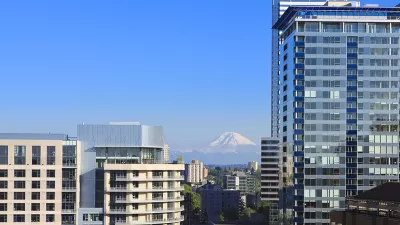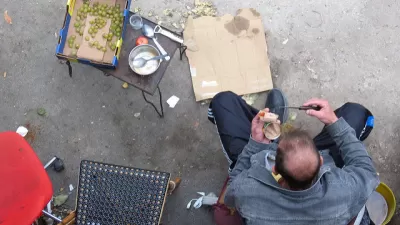Three major American cities this week—San Francisco, Dallas, and Los Angeles—responded to the growing number of homeless living on the streets with sweeps, arrests, and seizures, respectively.
It's been hard to avoid evidence of the criminalization of homelessness around the country over the past week.
First came the news, reported by Gale Holland for the Los Angeles Times, that the city of Los Angeles had confiscated several tiny homes donated to homeless living on the streets of that city.
A few days later, Tasha Tsiaperas reported that Dallas had arrested more than 200 people in Downtown for violations of the city's panhandling ordinance. The arrests came after "Downtown residents and workers have complained for months that they are routinely asked for money," writes Tsiaperas.
Finally, in a move that attracted national attention, San Francisco swept away a homeless camp located on Division Street, citing health concerns. Phillip Matier and Andrew Ross reported, via City Hall sources, that "[h]aving the health department take the lead on declaring Division Street uninhabitable was intended in part to deflect criticism that Lee’s administration is criminalizing homelessness."
Writing for Governing magazine, J.B. Wogan describes the actions of San Francisco as doing just that—maybe even skirting federal guidelines about what not to do when relocating homeless populations. Wogan also includes a list of cities, including Baltimore and Honolulu, that have recently struggled to deal with homeless encampments.
For more on the San Francisco homeless sweep, see earlier coverage from C.W. Nevius about the neighborhood outcry over the homeless encampment and an op-ed by Jennifer Friedenback, who presents a withering critique of how the city handled the people living in the camp on Division Street.
FULL STORY: SF moves to clear Division Street homeless encampment

Alabama: Trump Terminates Settlements for Black Communities Harmed By Raw Sewage
Trump deemed the landmark civil rights agreement “illegal DEI and environmental justice policy.”

Study: Maui’s Plan to Convert Vacation Rentals to Long-Term Housing Could Cause Nearly $1 Billion Economic Loss
The plan would reduce visitor accommodation by 25% resulting in 1,900 jobs lost.

Why Should We Subsidize Public Transportation?
Many public transit agencies face financial stress due to rising costs, declining fare revenue, and declining subsidies. Transit advocates must provide a strong business case for increasing public transit funding.

Paris Bike Boom Leads to Steep Drop in Air Pollution
The French city’s air quality has improved dramatically in the past 20 years, coinciding with a growth in cycling.

Why Housing Costs More to Build in California Than in Texas
Hard costs like labor and materials combined with ‘soft’ costs such as permitting make building in the San Francisco Bay Area almost three times as costly as in Texas cities.

San Diego County Sees a Rise in Urban Coyotes
San Diego County experiences a rise in urban coyotes, as sightings become prevalent throughout its urban neighbourhoods and surrounding areas.
Urban Design for Planners 1: Software Tools
This six-course series explores essential urban design concepts using open source software and equips planners with the tools they need to participate fully in the urban design process.
Planning for Universal Design
Learn the tools for implementing Universal Design in planning regulations.
Smith Gee Studio
Alamo Area Metropolitan Planning Organization
City of Santa Clarita
Institute for Housing and Urban Development Studies (IHS)
City of Grandview
Harvard GSD Executive Education
Toledo-Lucas County Plan Commissions
Salt Lake City
NYU Wagner Graduate School of Public Service




























